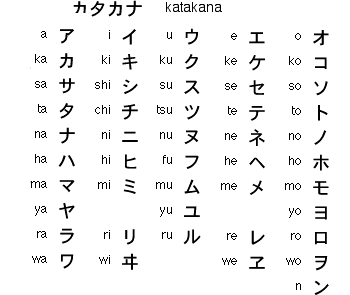Lesson 1
the alphabet.
The Japanese alphabet is very different from our own (english alphabet).
I will not be posting Kanji because there are like over 60,000 of them i think it's 2000 of them that you have to know to be able to read most Japanese Literature. I'm only posting katakana and hiragana and it will be up to you if you want to memorize them.
This Lesson is only for people who really want to learn how to read Japanese. As for learning kanji you can buy books or there are a number of sites even free sites that teach you how to read kanji.
Katakana is only used for foreign names and words.


Hiragana is used for other writing.


Most words are in kanji they either have one kanji or are combined with other kanji to make a word.






